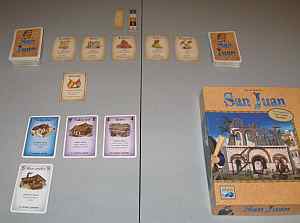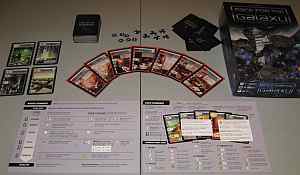Take Your Pick of San Juan or Race for the Galaxy
Welcome to the 5th in a series of reviews of 10 of my favorite board games. Today I visit with a child and step child of Puerto Rico, San Juan (the capital of Puerto Rico) and Race for the Galaxy (an otherworldly adventure).

San Juan was created by Andreas Seyfarth who also designed Puerto Rico. Race for the Galaxy was designed by Tom Lehmann. Both are card games based on Puerto Rico.
San Juan keeps the same theme as Puerto Rico. Race for the Galaxy does not. Both Puerto Rico and San Juan, as you might guess, have buildings, goods, cash, and victory points. Race for the Galaxy has similar items with a few additional twists including a military feature. The difference, of course, is that San Juan and Race for the Galaxy incorporate all these items within a deck of cards. In San Juan, there are cardboard bits for role selection and trade values for goods. Race for the Galaxy does have cardboard victory point chips, but everything else is in the cards.
San Juan is by far the easier of the two games to learn and play – especially if you’ve played PR. And yet it’s different enough from Puerto Rico that you’ll enjoy owning both. San Juan is also great with 2 players – something not doable in Puerto Rico.

Race for the Galaxy is more complex and, like Puerto Rico, will take several plays to fully appreciate. It has more depth of strategy, and the different rules make it worth owning alongside Puerto Rico and San Juan as well.
I’m not going into much more detail about San Juan here. Read yesterday’s review of Puerto Rico, and then imagine doing most of that with a deck of cards, where cards show buildings, are laid face down as goods, are cashed in for more cards, and have victory point values.
Race for the Galaxy also has role selection, but it’s simultaneous and blind. Each player has a hand of role cards and chooses one at the beginning of each round. When all players have chosen a role, all roles are revealed. You get the benefit of the role you chose, even if someone else chose the same role. Other players may opt to act out the role as well, but without the benefit.
The roles are numbered 1 to 5 and are acted out in that order. If a given role was not selected by any player, it is simply skipped.
It takes more experience playing Race for the Galaxy to determine which role to select. It also matters how experienced your opponents are. You may calculate and hope that someone else will select a role you want to show up this round, but will they? Or do you have to select it yourself this time?
Some players have complained about the symbols used on the cards, but I think the complaints are unjustified. An eye symbol means you can look at some cards. A hand means you can take some cards. Everything is color coded. And so on. It’s really another facet of the experience factor. The more you play, the easier it gets.
Check the price of San Juan on Amazon.
Check the price of Race for the Galaxy on Amazon.

Pingback:Puerto Rico - One of the Most Popular Board Games of Ever